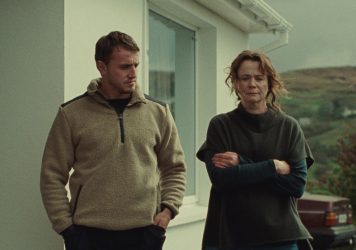A young father and his 11-year-old daughter take a holiday to Turkey in Charlotte Wells' touching debut.
How does one say goodbye to a memory? By unearthing its immense power, typically tucked away in a fragment of a whole, and letting the camera roll. Scottish director Charlotte Wells locates the answer somewhere in the expansive emotional world of Aftersun, her feature debut. The film transforms a week into an eternity as Calum (Paul Mescal) and his 11-year old daughter, Sophie (newcomer Frankie Corio) reunite for their annual package holiday on the Turkish coast, armed with a camcorder to capture it all. Between the bright blues skies and the peachy-pink hues of sun-soaked skin, time allows for so much, that we can almost see moments becoming memories.
Eleven is the age when the distance between children and parents grows into a chasm, and Aftersun dwells precisely in that ever-deepening rift. Even when negotiating the process, father and daughter seem to possess an affective synergy, a reassurance beyond wordiness emanates from the way Sophie anticipates his worry and muffles “I’m fine” without even looking up. While their conversations could be considered brisk, they also fold in the silences that bookend a line of dialogue. In fact, the film is so attentive to its tonal shifts that it offers a typology of silences: caring, hesitant, embarrassed, but never the same one twice.
There is an urge to make time last also in the way cinematographer Gregory Oke almost always frames Sophie together with Calum in a medium or close up shot, their boundaries exposed now porous, then – hardening. But when observing Calum on his own, the camera retreats, allowing only a view that is obstructed, reflected, or from afar – as if melancholy glues together the person and the memory. For Sophie, her dad feels close and yet unknowable – he may dance, do tai chi, and come up with fun activities – but his inner world remains a mystery save for such manifestations, rendered raw through Mescal’s performance of toppling stoicism. Aftersun gives all its love to a past reimagined, as it punctures the present.
Throughout the film, one scene cuts through the summer slowness repeatedly, and with an arresting beat. Fragments of a rave appear in between the strobe lights cues, to reveal an older woman (supposedly Sophie) dancing, her gaze wandering in the crowd. As the sequence bleeds into the ‘past’ timeline with a hypnotic use of ‘Under Pressure’, its liminal space – is it real? Is it a dream? – aligns remembering with reinventing, their superimposition a metaphor for the whole film as a play on reimagining the other.
In a way, the whole of Aftersun plays out in reverse in its first four minutes when we see a tape being rewound, its distortion still recalling a family holiday. There are two films in here: one made from home videos, the other – its repository. In line with such proximity, Wells’ fascination with how past and present coexist focuses on the points of eruption, the slow trickle, the stickiness of memory like ice cream on your fingers on a hot summer’s day.
Published 14 Nov 2022
All we want to see is Paul Mescal in a dad role.
Kleenex in hand, you’ll want to call your parents asap.
An ode to cinema as a machine for remembering.

The Scottish filmmaker behind breakout indie Aftersun explains the complex process of portraying memory in cinema.

Emily Watson and Paul Mescal enter into a battle of mother-son wills in this gorgeously-mounted but unoriginal Irish thriller.